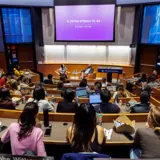
Pursuing Work-Life Balance in a Post-Pandemic World
Rachel Feintzeig, the Wall Street Journal’s “Work & Life” columnist, spoke as part of the R. Peter Straus Lecture series.
By Karen Guzman
The global COVID-19 pandemic blew up the traditional, in-the-office work week for a lot of people, but it didn’t necessarily make achieving the elusive work-life balance easier, Wall Street Journal columnist Rachel Feintzeig told students at the Yale School of Management on February 13.
“I think something has shifted, but I’m not sure where it’s going to go,” Feintzeig said. While remote work arrangements have made life less hectic for some workers, others feel isolated in at-home offices and anxious about missing out on valuable facetime with managers.
The problem isn’t a new one. How to balance a successful career with a satisfying personal life “is one of the core never-ending questions of my column,” said Feintzeig, the Journal’s “Work & Life” columnist.



Feintzeig spoke at Yale SOM as part of the R. Peter Straus Lecture series. Named for R. Peter Straus YC ’44, a pioneer in public-service radio, the series hosts talks with prominent individuals on topics related to the press and public responsibility. Yale SOM Dean Kerwin K. Charles moderated a discussion that touched on issues in today’s evolving workplace, where a new generation is redefining success.
The quest for a healthier work and life mix is being driven by the growing ranks of remote-work and hybrid employees, as well as a new generation, who are realizing there are more important things in life than professional success, Feintzeig said.
This realization has fueled the “quiet quitting” trend that’s seen employees leaving the workforce or opting for reduced roles. At the same time, a new generation of workers, more invested in their personal lives, is seeking environments that foster work-life balance.
“It’s a different kind of ambition,” Feintzeig said. “They’re serious about their careers and building skills and making a difference…but they also want to be their best selves and kill it in their personal lives, too… It’s not all about climbing the ladder.”
Nowhere is this trend more prevalent than among working parents, especially women who continue to shoulder most of the childcare and home responsibility.
“Balance is hard for all working parents,” Feintzeig said. “And there’s a lot of research showing women just do a lot more at home, and the pandemic has not made that go away.”
Feintzeig encouraged students who will be entering the workforce soon to look for organizations with good management. She advised interviewing students to note the way that their prospective managers treat employees and to be wary of organizations with high-turnover, “revolving-door” workforces.
Employees at all career stages need also to be up front about their need for boundaries between work and life—especially with managers who believe that technology means an “always available” workforce—and to prioritize self-care and time with family. Periods of unplugged time when an employee is literally unreachable are a good start, Feintzeig said.
She also encouraged students to advocate for national parental leave policies, and she urged both men and women to take parental leave. She called attention, too, to the many workers who still do not have any paid leave—much less flexible work options—in the United States, and the need for policies to address the situation




